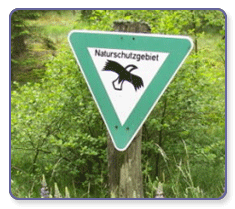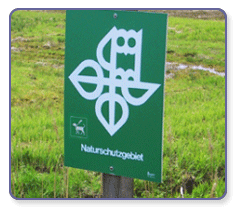| German 3b; Die Umwelt |
|
| Sections: Introduction | Stufe 1 | Stufe 2 | Stufe 3 | Grammatik | Verben | Wörterbuch |
| Stufe 2: Seite A | Seite B | Seite C | Seite D | Seite E | Seite F | |
| Lektion 10 Stufe 2 Seite D   Zwei weitere Naturschutzgebiet-Schilder
Es gibt viele schöne Naturgebiete in den deutschsprachigen Ländern. Hier sind nur ein paar davon: die Sächsische Schweiz, der Bayerischer Wald, der Thüringer Wald, die Lüneburger Heide, der Harz (ein Mittelgebirge), das Allgäu, der Spreewald und der Schweizer Nationalpark. Für vier davon finde drei Informationen, die dich interessieren und gib die Webseite an, wo du sie gefunden hast. Du darfst auf Englisch schreiben und die Informationen nur auflisten. Das ist kein Aufsatz. Diese Aufgabe hat 24 Punkte. (Do a websearch for FOUR of the natural areas given above, and write down three bits of information about each that you find interesting. Also paste in the web address where you found your information. You may write in English and merely list the information. This is not an essay.) Übe die Vokabelkarten auf Seite 1C, bis du sie alle richtig hast. Dann mach dieses Kreuzworträtsel. Vergiss nicht, alles groß zu schreiben. Ä = AE Ö = OE Ü = UE ß = SS Du hast dieses Suffix in den Vokabelkarten 1C zweimal gesehen: abbaubar und erneuerbar. Von den englischen Wörtern kannst du leicht verstehen, dass –bar "–able" bedeutet. Also, was bedeuten dann abbauen und erneuern? Hast du "degrade" and "renew" gesagt? Richtig! Also, um "able to be" + verb zu sagen, schreibt man verb stem + - bar. Wie sagt man diese Wörter auf Deutsch? Rate mal! Beim Klicken siehst du die richtige Antwort.
Do you remember why we had to have a separate section to explain this? In English we use: present perfect tense ("has been…") and the preposition "for." What do you have to use in German? Richtig! Present tense and the preposition "seit." Nun mach jetzt diese Übung noch einmal.
Again, the German doesn't match the English, so we had a separate section for it. In English it's: "want" + (person, as direct object) + infinitive. "I want him to go home." "She would like me to stay longer." In German, however, it's quite different. "wollen/möchten" + "dass" + (person, nominative!) + conjugated verb at the end. "Ich will, dass er nach Hause geht." "Sie möchte, dass ich länger bleibe." Nun mach jetzt diese Übung noch einmal. Wie sagt man:
Wenn, wann, als? Do you remember how to use each of these three words, all of which can be translated "when"? Wann is used in asking questions, both direct and indirect questions. Wann fährt der Zug ab? Ich möchte wissen, wann der Zug abfährt. Als is also not hard: it is used when talking about any single event in the past. Als ich ein kleiner Junge war,... Wenn is the trickiest of the three, because it has multiple uses: It can mean "when" to answer a "wann" question: Der Film beginnt, wenn alle da sind. ("Wann beginnt der Film?") It can mean "when" to describe a situation. Wenn die Sonne scheint, haben wir mehr Spaß. It can also mean "when" (or "whenever") in talking about repeated past events. Wenn es regnete, sahen wir die Würmer. (Whenever it rained, we saw the worms.) Was sagt man für "when": wenn, wann, oder als?
Weiter: Stufe 2, Seite E |
||||||||||||||||||||||||
| © 2007 Aventa Learning. All rights reserved. |